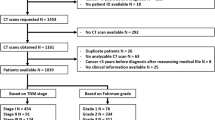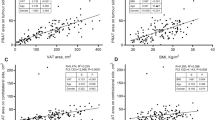Abstract
The aim of this study was to evaluate the clinical significance of visceral fat accumulation as a prognostic factor in patients with metastatic renal cell carcinoma (mRCC) treated with systemic therapies. A total of 114 patients were retrospectively reviewed. All patients received systemic therapy for mRCC at Keio University hospital in Japan. The intra-abdominal visceral fat area was determined by computed tomography at the umbilical level. The visceral fat accumulation was defined as ≥100 cm2. The mean visceral fat area was 107.4 ± 62.8 cm2. In the whole cohort, the median follow-up was 29 months. According to the Memorial Sloan Kettering Cancer Center (MSKCC) classification, 27.2% patients were favorable risk, 53.5% were intermediate risk, and 19.3% were poor risk. Visceral fat accumulation correlated with improved progression-free (P = 0.0070) and overall survival (P = 0.0001). On multivariate analysis, visceral fat accumulation (P = 0.0290) and MSKCC classification (P = 0.0085) were independent indices to predict progression-free survival in first-line treatment. In addition, visceral fat accumulation (P = 0.0007) and MSKCC classification (P = 0.0005) independently predicted overall survival. Prognostic grouping using visceral fat accumulation was identified as an independent prognostic marker in patients with mRCC. The addition of visceral fat accumulation improved the prognostic value of MSKCC classification alone in predicting overall survival in patients treated with systemic therapy for mRCC.



Similar content being viewed by others
References
Popkin BM, Doak CM. The obesity epidemic is a worldwide phenomenon. Nutr Rev. 1998;56:106–14.
Chow WH, Dong LM, Devesa SS. Epidemiology and risk factors for kidney cancer. Nat Rev Urol. 2010;7:245–57.
Calle EE, Kaaks R. Overweight, obesity and cancer: epidemiological evidence and proposed mechanisms. Nat Rev Cancer. 2004;4:579–91.
Donat SM, Salzhauer EW, Mitra N, Yanke BV, Snyder ME, Russo P. Impact of body mass index on survival of patients with surgically treated renal cell carcinoma. J Urol. 2006;175:46–52.
Hakimi AA, Furberg H, Zabor EC, et al. An epidemiologic and genomic investigation into the obesity paradox in renal cell carcinoma. J Natl Cancer Inst. 2013;105:1862–70.
Rogde AJ, Gudbrandsdottir G, Hjelle KM, Sand KE, Bostad L, Beisland C. Obesity is associated with an improved cancer-specific survival, but an increased rate of postoperative complications after surgery for renal cell carcinoma. Scand J Urol Nephrol. 2012;46:348–57.
Steffens S, Ringe KI, Schroeer K, et al. Does overweight influence the prognosis of renal cell carcinoma? Results of a multicenter study. Int J Urol. 2013;20:585–92.
Mano R, Hakimi AA, Zabor EC, et al. Association between visceral and subcutaneous adiposity and clinicopathological outcomes in non-metastatic clear cell renal cell carcinoma. Can Urol Assoc J. 2014;8:E675–80.
Albiges L, Hakimi AA, Xie W, et al. Body Mass Index and metastatic renal cell carcinoma: clinical and biological correlations. J Clin Oncol. 2016;pii:JCO667311.
Yuge K, Miyajima A, Jinzaki M, et al. How does visceral obesity affect surgical performance in laparoscopic radical nephrectomy? Jpn J Clin Oncol. 2015;45:373–7.
New criteria for ‘obesity disease’ in Japan. Circ J. 2002;66:987–92.
Motzer RJ, Bacik J, Murphy BA, Russo P, Mazumdar M. Interferon-alfa as a comparative treatment for clinical trials of new therapies against advanced renal cell carcinoma. J Clin Oncol. 2002;20:289–96.
Heng DY, Xie W, Regan MM, et al. Prognostic factors for overall survival in patients with metastatic renal cell carcinoma treated with vascular endothelial growth factor-targeted agents: results from a large, multicenter study. J Clin Oncol. 2009;27:5794–9.
Choueiri TK, Garcia JA, Elson P, et al. Clinical factors associated with outcome in patients with metastatic clear-cell renal cell carcinoma treated with vascular endothelial growth factor-targeted therapy. Cancer. 2007;110:543–50.
Manola J, Royston P, Elson P, et al. Prognostic model for survival in patients with metastatic renal cell carcinoma: results from the international kidney cancer working group. Clin Cancer Res. 2011;17:5443–50.
Tisdale MJ. Mechanisms of cancer cachexia. Physiol Rev. 2009;89:381–410.
Fearon K, Arends J, Baracos V. Understanding the mechanisms and treatment options in cancer cachexia. Nat Rev Clin Oncol. 2013;10:90–9.
Alberti L, Thomachot MC, Bachelot T, Menetrier-Caux C, Puisieux I, Blay JY. IL-6 as an intracrine growth factor for renal carcinoma cell lines. Int J Cancer. 2004;111:653–61.
Oya M, Horiguchi A, Mizuno R, Marumo K, Murai M. Increased activation of CCAAT/enhancer binding protein-beta correlates with the invasiveness of renal cell carcinoma. Clin Cancer Res. 2003;9:1021–7.
Guida M, Casamassima A, Monticelli G, Quaranta M, Colucci G. Basal cytokines profile in metastatic renal cell carcinoma patients treated with subcutaneous IL-2-based therapy compared with that of healthy donors. J Transl Med. 2007;5:51.
Tsoli M, Schweiger M, Vanniasinghe AS, et al. Depletion of white adipose tissue in cancer cachexia syndrome is associated with inflammatory signaling and disrupted circadian regulation. PLoS ONE. 2014;9:e92966.
Ibrahim MM. Subcutaneous and visceral adipose tissue: structural and functional differences. Obes Rev. 2010;11:11–8.
Fontana L, Eagon JC, Trujillo ME, Scherer PE, Klein S. Visceral fat adipokine secretion is associated with systemic inflammation in obese humans. Diabetes. 2007;56:1010–3.
Donohoe CL, Doyle SL, Reynolds JV. Visceral adiposity, insulin resistance and cancer risk. Diabetol Metab Syndr. 2011;3:12.
Parekh N, Okada T, Lu-Yao GL. Obesity, insulin resistance, and cancer prognosis: implications for practice for providing care among cancer survivors. J Am Diet Assoc. 2009;109:1346–53.
Author information
Authors and Affiliations
Corresponding author
Ethics declarations
Conflict of interest
Ryuichi Mizuno MD has received honoraria from Novartis and Pfizer. Mototsugu Oya MD has received honoraria from Bayer, Novartis, and Pfizer. Other authors declare that they have no conflict of interest.
Ethical standards
All procedures performed in studies involving human participants were in accordance with the ethical standards of Keio University Research Ethics Committee https://www.ccr.med.keio.ac.jp/rinri/top.php (Approval No-20130424) and with the 1964 Helsinki Declaration and its later amendments or comparable ethical standards.
Informed consent
Informed consent was obtained from all individual participants included in the study.
Rights and permissions
About this article
Cite this article
Mizuno, R., Miyajima, A., Hibi, T. et al. Impact of baseline visceral fat accumulation on prognosis in patients with metastatic renal cell carcinoma treated with systemic therapy. Med Oncol 34, 47 (2017). https://doi.org/10.1007/s12032-017-0908-3
Received:
Accepted:
Published:
DOI: https://doi.org/10.1007/s12032-017-0908-3




